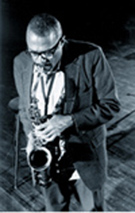
|
|
|
|
|
|
Photo Credit: Jeffrey Kliman |
Andrew White
This week, Dr. Taylor welcomes jazz saxophonist Andrew White, a uniquely talented multi-instrumentalist, composer, educator, entrepreneur, and self-described "Coltrane-ologist." Among other gigs, White has worked with Stevie Wonder, the late saxophonist Julius Hemphill, Weather Report, and the American Ballet Theater. In addition to producing and releasing all of his own albums independently, White has written several novels and numerous musical instruction books. Known as a "musician's musician," he's also taken on the heroic task of transcribing nearly all of John Coltrane's legendary solos. White and Dr. Taylor's trio open the show hot, getting the audience revved up with a ferocious rendition of "Bye, Bye, Blackbird," showcasing White's electrifying alto sax. After this inspiring display of his passionate technique, White humourously relates how he quickly excelled at playing both soprano and alto sax, oboe, English horn, the upright bass, and the piano between 6th and 10th grade. He then goes on to clear up a misunderstanding about the time he spent playing oboe and English horn in the Tennessee State University band. Several scholars have mistakenly assumed that White was attending TSU at that point--he was actually still in high school. Throughout the conversation, White reveals himself not only as a musician, but also as a businessman. Many musicians compensate White for his Cotrane expertise, and Dr. Taylor asks how he got started in the lofty profession of transcribing jazz solos. At the end of a somewhat lengthy answer, White whimsically says that it's "natural talent," and proceeds to demonstrate his innate skill with two "off the hook" versions of the Charlie Parker tune, "Kim." White's musical abilities go well beyond transcribing and playing: he's also an accomplished composer, creating works for everything from conventional jazz ensembles to large symphonies. During the show's Q&A segment, an audience member asks White how he meshes his technique with musicality; White replies with a rather academic answer, citing his own writings on musical theory. Another question from the audience calls for advice on how to keep going even when the proverbial "chips are down." Again, White refers to his many published works before talking about the fundamental importance of staying focused and practicing. Dr. Taylor then asks how White uses European classical music in his improvisations. The artist explains that he often tries to incorporate certain elements of classical compositions into his own performance, then demonstrates the approach with Dr. Taylor's trio on the Tin Pan Alley classic, "Everything I Have Is Yours." The dialogue picks up again with Dr. Taylor asking White if he thinks it's important for musicians today to be stylistically versatile. White responds with a resounding "yes," pointing out that his own career once saw him playing oboe for the American Ballet Theater at the same time he was committed to playing electric bass with the Fifth Dimension. To close an engaging evening of conversation and music, White and the trio interpret the fiery blues composition, "Red Top."
|
|
| |
